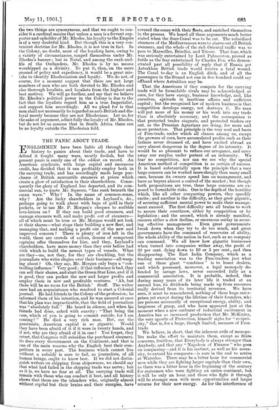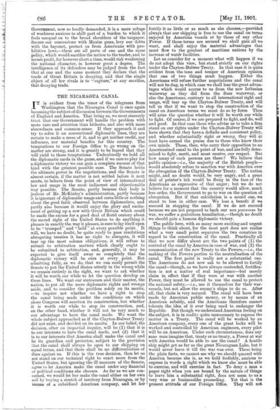• THE PANIC ABOUT TRADE.
-9NGLISHMEN have been liable all through their 1 history to panics about their trade, and. have to defend it fought many wars, mostly foolish, but the present panic is surely one of the oddest on record. An American syndicate, with large capital and enormous credit, has decided that it can profitably employ both in the carrying trade, and has accordingly made large pur- chases of British mercantile steamers at prices which create a glow of satisfaction in their shareholders. Conse- quently the glory of England has departed, and. its com- mercial sun, to quote Mr. Squeers, "has sunk beneath the ocean wave." Why ? In the name of common-sense, why ? Are the lucky shareholders in Leyland's, &c., perhaps going to walk about with bags of gold in their pockets, or to use Mr. P. 3(forgan's cheques to scribble love-letters on ? If they can build good steamers, and manage steamers well, and. make profit out of steamers— all of which must be true or Mr. Morgan would not look at their shires—what stops their building a new fleet, and managing that, and making a profit out of the new and improved. concern ? There is plenty of iron left in the world, there are crowds of sailors, dozens of competent captains offer themselves for hire, and. they, Leyland's shareholders, have more money than they ever before had with which to build the newest types of vessels. What are they—no, not they, for they are chuckling, but the journalists who write elegies over their business—all weep- ing about? Oh, they say, Mr. Morgan only buys a "con- trolling influence." Very good.; if that influence is bad, they can sell their shares, and start the Green Star Line, and if it is good, they can pocket the new and larger profits and employ them in new and profitable ventures. 'Ah, but there will be no room for the British.' Stuff. The writer once had an acquaintance who resolved to start a Colonial journal. He had friends in the Colony of the profession; he informed. them of his intention, and. he was assured at once that his plan was impracticable, that the field of journalism was "absolutely full." He heard in silence, and when his friends had done, asked with suavity : "That being the case, which of you is going to commit suicide, for I am coming ? " He died a very rich man. But, say the pessimists, American capital. is so gigantic. Would they have been afraid of it if it were in twenty hands, and if not, why are they afraid of it in one? You forget, they retort, that Congress will subsidise the purchased steamers. So does every Government on the Continent, and that is one of the main reasons why the English beat their com- petitors in every port. The business which cannot live without a subsidy is sure to fail, as journalists, of all :human beings, ought to know best. If we did not clistin- - guish writers on shipping from shipowners, we should. say that what had failed. in the shipping trade was nerve; but as it is, we have no fear at all. The carrying trade will remain with those who can conduct it best, and. all history shows that those are the islanders who, originally almost without capital but their brains and their energies, have covered the ocean with their fleets, and enriched themselves in the process. We heard all these arguments much better stated when the Suez Canal was to be cut. The subsidised steamers of the Mediterranean were to starve out all British steamers, and the whole of the rich Oriental traffic was to pass to Marseilles, Brindisi, and Trieste. That fear, which was seriously entertained by Lord Palmerston, proved as futile as the fear entertained by Charles Fox. who demon- strated past all possibility of reply that if Russia got Astrakhan British trade would receive a fatal wound. The Canal to-day is an English ditch, and of all the passengers in-the Strand not one in five hundred conld say offhand where Astrakhan may be.
That the Americans if they compete for the carrying trade will be formidable rivals may be acknowledged. at once, for they have energy, business knowledge, and, like ourselves, aptitude in maritime affairs and sufficient capital ; but the recognised law of modern business is that competition develops energy, not destroys it. No man will put more of his money or his work into any trade than is absolutely necessary, and the consequence is that protected. trades stagnate, and protected traders cry out, as the Prussian Agrarians are doing, for more and more protection. That principle is the very soul and. basis of Free-trade, under which all classes among us, except the growers of corn, have accumulated. profits such as their fathers never dreamed of, and have excited abroad an envy almost dangerous in the degree of its intensity. It would be so pleasant to reduce our arrogance, and. carry away our surplus under pretext of an indemnity. We fear no competition, nor can we see why the special American method. of competition is so certain of success. It is based. substantially upon the principle that a very large concern can be worked more cheaply than many small ones, because its owners spend less on management, and have as buyers almost a control of the market; but though both propositions are true, these large concerns are ex- posed to formidable risks. One is the depth of the hostility which, like all other conquering powers, they speedily excite ; and another is the difficulty, as they grow gigantic, of securing sufficient mental power to make their manage- ment succeed. The first difficulty sets all brains to work to secure their overthrow, either by competition or by legislation ; and the second, which is already, manifest, ensures either a slow decline, or enormous outlay in secur- ing effective management. Even great governments break down when they try to do too much, and great governments have the command of reservoirs of ability, the whole ability of the nation in fact, such as no company can command. We all know how gigantic businesses when turned into companies wither away, the profit of 30 per cent. dying down to 10 or 5 per cent., and. then disappearing. The East India Company, which as a trading association was to the Free-traders just what one of these giant " combines " is to lesser dealers, and. which possessed, moreover, a legal monopoly de- fended. by savage laws, never succeeded 'fully as a commercial association. It is probable, indeed, that during many years of its later life it traded. at an annual loss, its dividends being made up from resources really derived from its territorial revenues. We have seen, it must be remembered, nothing of these huge enter- prises yet except during the lifetime of their founders, will are persons necessarily of exceptional energy, ability, and largeness of grasp, and who have appeared just at the moment when a new outburst of industrial excitement in America has so increased production that Mr. McKinley, the very apostle of Protection, himself sighs for "reciprocity," that is, for a large, though limited, measure of Free- trade.
We believe, in short, that the inherent evils of monopo- lies make the effort to maintain them, except as State concerns, fruitless, that Everybody is always stronger than Anybody, and. that any "Napoleon of Finance" who goes on conquering—and it is his. instinct, as well as his neces- sity, to extend his conquests—is sure in the end. 'to arriVe at Waterloo. There may be a bitter hour for 'commercial men while they are fighting: larger capitals than their own, as there was a bitter hour in the beginning of the century for statesmen who were fighting an entire continent, but it will be only an hour, and those who fight it through will be stronger Men with more opportunities and larger returns for their new energy. As for the interference of Government, now so loudly demanded, it is a mere refuge of weakness anxious to shift part of a burden to which it feels unequal on to the broad shoulders of the taxpayer. Secure our concessions with Maxim guns, levy our debts with the bayonet, protect us from Americans with pro- hibitive laws,—these are all parts of one and the same policy, which would sacrifice the nation to the trader, and to secure profit, for however short a time, would risk weakening the national character, in however Feat a degree. The intelligence of its defenders may be judged from the fact that at one and the same moment they declare that the trade of Great Britain is decaying, and that the single object of all her rivals is to "capture," at any sacrifice, that decaying trade.







































 Previous page
Previous page